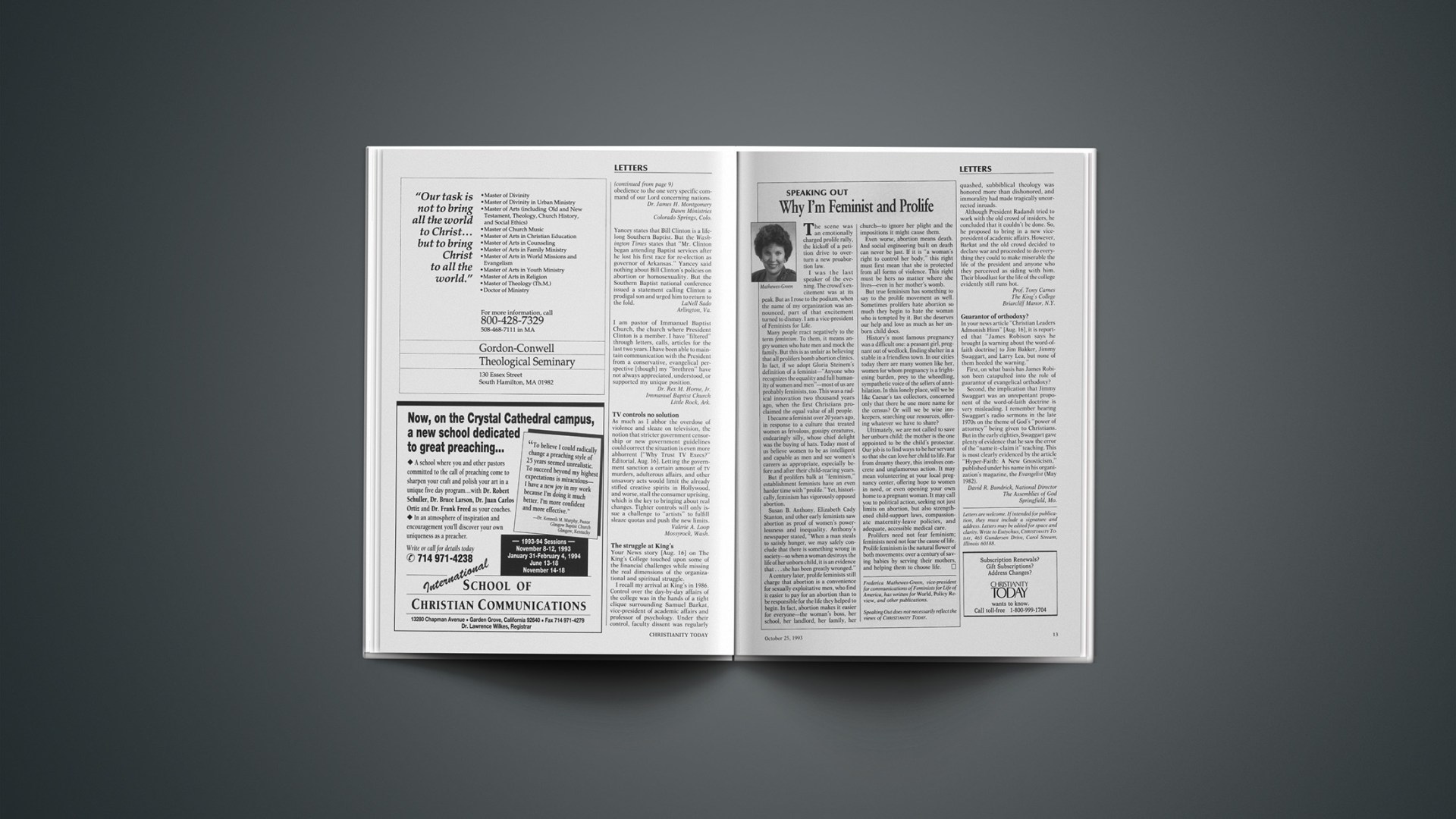The scene was an emotionally charged prolife rally, the kickoff of a petition drive to overturn a new proabortion law.
I was the last speaker of the evening. The crowd’s excitement was at its peak. But as I rose to the podium, when the name of my organization was announced, part of that excitement turned to dismay. I am a vice-president of Feminists for Life.
Many people react negatively to the term feminism. To them, it means angry women who hate men and mock the family. But this is as unfair as believing that all prolifers bomb abortion clinics. In fact, if we adopt Gloria Steinem’s definition of a feminist—“Anyone who recognizes the equality and full humanity of women and men”—most of us are probably feminists, too. This was a radical innovation two thousand years ago, when the first Christians proclaimed the equal value of all people.
I became a feminist over 20 years ago, in response to a culture that treated women as frivolous, gossipy creatures, endearingly silly, whose chief delight was the buying of hats. Today most of us believe women to be as intelligent and capable as men and see women’s careers as appropriate, especially before and after their child-rearing years.
But if prolifers balk at “feminism,” establishment feminists have an even harder time with “prolife.” Yet, historically, feminism has vigorously opposed abortion.
Susan B. Anthony, Elizabeth Cady Stanton, and other early feminists saw abortion as proof of women’s powerlessness and inequality. Anthony’s newspaper stated, “When a man steals to satisfy hunger, we may safely conclude that there is something wrong in society—so when a woman destroys the life of her unborn child, it is an evidence that … she has been greatly wronged.”
A century later, prolife feminists still charge that abortion is a convenience for sexually exploitative men, who find it easier to pay for an abortion than to be responsible for the life they helped to begin. In fact, abortion makes it easier for everyone—the woman’s boss, her school, her landlord, her family, her church—to ignore her plight and the impositions it might cause them.
Even worse, abortion means death. And social engineering built on death can never be just. If it is “a woman’s right to control her body,” this right must first mean that she is protected from all forms of violence. This right must be hers no matter where she lives—even in her mother’s womb.
But true feminism has something to say to the prolife movement as well. Sometimes prolifers hate abortion so much they begin to hate the woman who is tempted by it. But she deserves our help and love as much as her unborn child does.
History’s most famous pregnancy was a difficult one: a peasant girl, pregnant out of wedlock, finding shelter in a stable in a friendless town. In our cities today there are many women like her, women for whom pregnancy is a frightening burden, prey to the wheedling, sympathetic voice of the sellers of annihilation. In this lonely place, will we be like Caesar’s tax collectors, concerned only that there be one more name for the census? Or will we be wise innkeepers, searching our resources, offering whatever we have to share?
Ultimately, we are not called to save her unborn child; the mother is the one appointed to be the child’s protector. Our job is to find ways to be her servant so that she can love her child to life. Far from dreamy theory, this involves concrete and unglamorous action. It may mean volunteering at your local pregnancy center, offering hope to women in need, or even opening your own home to a pregnant woman. It may call you to political action, seeking not just limits on abortion, but also strengthened child-support laws, compassionate maternity-leave policies, and adequate, accessible medical care.
Prolifers need not fear feminism; feminists need not fear the cause of life. Prolife feminism is the natural flower of both movements: over a century of saving babies by serving their mothers, and helping them to choose life.
Frederica Mathewes-Green, vice-president for communications of Feminists for Life of America, has written for World, Policy Review, and other publications.
Speaking Out does not necessarily reflect the views of CHRISTIANITY TODAY.










